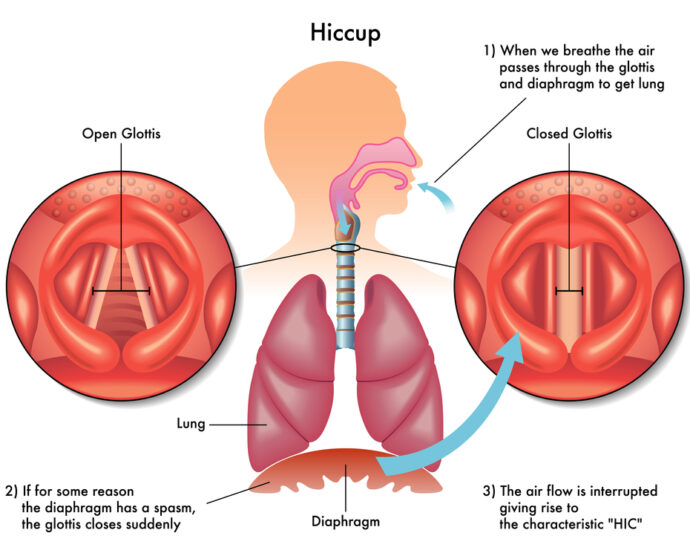Hiccups happen to everyone. Anyone can have hiccups, adults, children, and babies. A hiccup is an involuntary contraction of the diaphragm. The diaphragm is the muscle that helps you breathe, it is located between the chest and the abdomen. Hiccups are spasms that are uncontrollable. Hiccups usually only last a few minutes. If you have hiccups that last longer than 2 days, or you have recurring episodes over a prolonged period of time these are deemed chronic hiccups.
Chronic hiccups can cause some complications. They can get in the way of your eating, drinking, sleeping and speaking. They can also worsen in pain as they go on. Chronic hiccups can cause you to lose your appetite or your desire to eat and drink which can cause severe weight loss. They can also interrupt your sleep when they occur at night.
Page Contents
Causes
There are lots of things that can trigger common hiccups that last less than 48 hours. Drinking carbonated beverages or drinking too much alcohol. Eating too much can also cause hiccups. Being excited or being under emotional stress. Experiencing sudden temperature changes also causes hiccups. Swallowing too much air is another trigger.
Chronic hiccups usually occur because there is an underlying condition. One of the things that can put you at a higher risk for chronic hiccups is if you have recently undergone general anesthesia. Experiencing anxiety can also cause chronic hiccups. Surgery of the abdomen area is another risk factor. Illness of the liver, bowel, stomach or diaphragm can also be a cause of chronic hiccups.
Other risks are being pregnant, having cancer, having a sore throat, encephalitis, meningitis, stroke, brain injury, diabetes, kidney disease, or an electrolyte imbalance. Having GERD is another cause of chronic hiccups. Having a tumor, cyst, or growth on your thyroid gland can also put you at higher risk for chronic hiccups.
Diagnosis
Usually your doctor will just have to listen to your hiccups to be able to diagnose you with them. Besides doing a physical exam your doctor may want to run some other tests. Imagining tests such as an x-ray, CT scan, or MRI may be done to look for issues with the diaphragm or the nerve that controls the diaphragm. Endoscopic tests can also be done to check for problems with the esophagus or windpipe. Lab tests may be suggested to check for illnesses such as diabetes, kidney disease, or infections.
Treatment
Normal hiccups can be solved by drinking water quickly. Other common treatments of regular hiccups are breathing in a paper bag, or holding your breath.
Another treatment is swallowing granulated sugar, dry pieces of bread, or crushed ice. Hiccups can also be treated with gently pulling on your tongue, gagging, gargling water, or gently rubbing your eyeballs.
Chronic hiccups may need more than just drinking water quickly. The best option is to treat the underlying issue that is causing your chronic hiccups.
There are medications that you can take that can help when hiccups get too bad. Medications like baclofen, chlorpromazine, valproic acid, or metoclopramide.
Implanting a device that stimulates the vagus nerve can also be done. This is the nerve that controls the diaphragm.
Acupuncture has also been used as treatment.
Takeaway
Hiccups can be annoying and irritating. They usually go away on their own within 48 hours. If hiccups persist for longer than 2 days they are considered chronic and persistent. It is usually a sign of an underlying condition. Some people can have chronic hiccups for years.
It can cause complications with your eating, drinking, sleeping, and speaking if left untreated. There are treatment options to help stop the hiccups so that you are able to eat, drink, and get some sleep.
Chronic hiccups can affect the quality of life you are living so it is important to seek out medical advice if your hiccups are lasting longer than 2 days.
READ MORE: Foods That Lower Cancer Risk
Sources:
https://rarediseases.org/rare-diseases/hiccups-chronic/
https://www.healthline.com/health/chronic-hiccups#outlook
https://my.clevelandclinic.org/health/diseases/17672-hiccups
